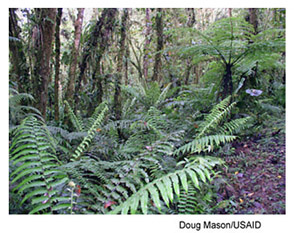 |
 |

 |
 |
Forests
 |
Forests are home to 70 percent of the world’s land-based
plants and animals. |
USAID works in more than 30 countries supporting projects that help protect and conserve forests. Project activities include on-the-ground efforts to reduce illegal logging, improve the management of protected forest areas, promote agroforestry, empower communities to responsibly manage local forest areas, and promote the adoption of reduced impact logging techniques. By protecting forest habitats, USAID helps conserve biodiversity, improve global environmental health, and secure the livelihoods of forest dependent communities around the world.
Forests are home to a rich array of trees, plants, and wildlife. Experts estimate that 70 percent of all land-based plants and animals live in forests. Forests provide habitat to some of the world’s most endangered species such as the Mountain Gorilla, orangutans, and tigers.
These threatened species are not the only ones dependent on forests for survival. More than 1.6 billion people worldwide depend on forests for some part of their livelihood. Forests provide a wealth of important wood and non-timber forest products (such as edible nuts and fruits, medicinal plants, fibers, and rubber) that people in the developed and developing world rely on. The value of wood and non-timber products provided by forests is immeasurable.
In addition, forests provide environmental services such as regulating water supplies and stemming soil erosion. These services have an enormous impact on worldwide agricultural productivity and human health. Forests play a crucial role as major stores of greenhouse gases, such as carbon. This important function contributes to reducing global warming.
Unfortunately, forests are being destroyed at unprecedented rates due to unsustainable and illegal logging, agricultural expansion, population pressures, large-scale industrial and infrastructure projects, and national policies that subsidize forest conversion to other uses. This destruction poses a serious threat to the well being of wildlife and human communities dependent on forests.
Learn more about USAID’s work in the forestry sector.
Back to Top ^
|
|
 |
 |
Tue, 27 Feb 2007 10:29:01 -0500
|
|
 |
 |


